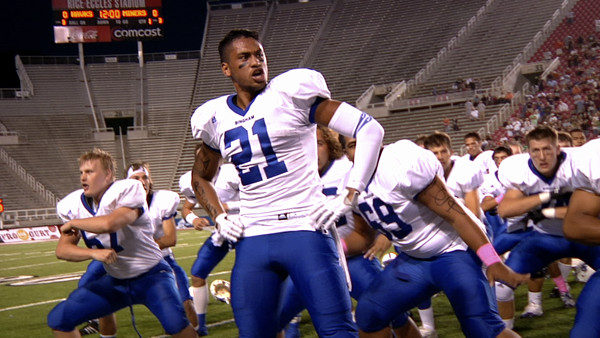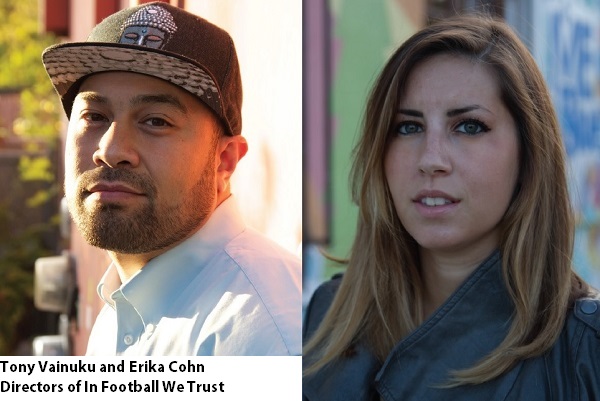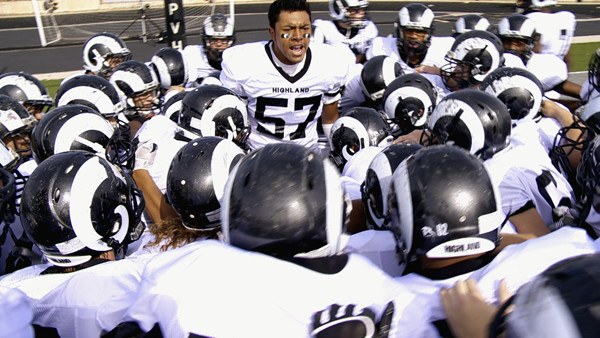The PBS Hawaiʻi Livestream is now available!
PBS Hawaiʻi Live TV
Premiere: Monday, February 1 at 10:00 pm
Encore: Saturday, February 6 at 8:00 pm
Harvey Langi, Leva and Vita Bloomfield, and Fihi Kaufusi are high school athletes in Salt Lake City, Utah. They all have the same goal: to play in the NFL. According to the film, Samoans and Tongans in the U.S. are 28 times more likely to play football in the NFL than any other ethnic group. But with family expectations, gang violence and stigma, it isn’t an easy path.
PBS Hawaii spoke with filmmakers Tony Vainuku and Erika Cohn by phone about their first feature-length documentary.
This interview has been edited for clarity and contains spoilers.

PBS Hawaii: This film was shot cinema verite style, which can be tough when you’re following your subjects in real time, not knowing how their story lines will pan out. Were there other subjects that ended up not making the cut?
Vainuku: We began with a whole different group. Originally, we started with Matt Asiata [now a running back for the Minnesota Vikings]. There was Thretton Palamo, who now plays rugby. I’d say the first subjects we clamped down were the Bloomfields and Harvey Langi. And then later, we brought in Fihi, who became our fourth subject.
With the other subjects that fell off, they have to be completely vulnerable and it is a lot of time you’re asking to spend with them. And for one reason or another, we weren’t able to include all those stories.
What was the greatest challenge in making this film?
Vainuku: I think one of the challenges is telling four stories in an hour and a half, and really being able to get the arc of the story in and get them all fleshed out. As a filmmaker, [doing this for] over five years and doing it independently, and for the first three or four years with basically no funding and getting these “nos” as far as trying to raising money. That was toughest, trying to tell this story that’s so important to you and just keeping up the funding and keeping yourself going and living in order to make this film.
Cohn: We had 600 hours of footage and to create a 90-minute film was incredibly challenging. A lot of times throughout the process, we got feedback to cut one of our subjects. That was feedback that we entertained, but we really wanted to be able to tell the stories of the Bloomfields, Fihi and Harvey.
As far as the funding challenges, Tony and I drew lines in the sand. Tony, wasn’t yours, like, you weren’t going to let your house go?
Vainuku: Yeah. I gave up my car, sacrificed a lot there. The one thing was to keep my home over making this film. Luckily, we got the film out just in time. [laughs]
Cohn: Thankfully! The hardest part of this was hearing no, after no, after no [while fundraising]. But in the long run, the process of not having financing for the first three years really shaped the way we went about making this film. We didn’t have the ability to have people doing sound or multiple cameras. It was just us. I think some of the intimacy comes from that really raw, gritty, pick up the camera and run-and-gun kind of shoot.
Vainuku: Yeah. One of the advantages to no funding is basically the freedom to do whatever. Nobody’s looking over your shoulder and telling you you have deadlines. We were able to really let the stories develop, and they went places that we would never have imagined. We couldn’t have written it better. Staying with them made all the difference.

As the story lines progressed, what was something that hit home for each of you?
Cohn: I can’t tell you how much I learned from our subjects. The whole filmmaking process taught me a lot about not just filmmaking, but about life in general and about myself. That’s something that I didn’t expect. That’s a beautiful gift.
Vainuku: I related to all of the stories. It was really personal for me. There were parts of my life within the kids. The story for me, because it was so personal, was my younger uncle’s story. His fall from ever making it into the NFL; he ended up going to prison instead. So being able to tell that story through four kids instead of one – words can’t describe how close I am to all of these kids because of it, and what they were able to accomplish with their lives.
I can name one scene that was really, really tragic, that meant the world to me, when Leva had his incident and was arrested. That scene was completely shot in real time. Getting that event and knowing that it was going to change lives really, really helped that cause of what their family was going through, and what a lot of other Polynesian families are going through. These vulnerable moments that we found within these stories: We have Harvey breaking down and all the pressure that he deals with with his parents, and then you have Fihi with the spiritual side of all Polynesians. I think as a whole, Polynesians are pretty spiritual.
It’s hard to name one thing, but [the film] definitely came out better that I would have ever expected, as far as what it was inspired by.
What was it like as a filmmaker to see a story unfold tragically, but not be able to interact?
Vainuku: There’s definitely different levels of it, and as a filmmaker, it’s a little nerve-wracking. You’re not supposed to be there. In that exact scene, I was being pushed out, and the mother was pushing me in there and making sure everything was fine with me staying. As a filmmaker, you’re just double-checking that that button is hitting record the whole time.
On a personal level, it was hard. You spend so much time with these kids. And not only the kids, but their parents, too. I’m older than the kids, so I totally want the same thing for them that their parents want, which is for them not to make a mistake and ruin their lives long-term. So seeing that was pretty tough. I think overall as a director, you want the story to be completely honest and truthful and want them to trust you with their story, so you kind of have to make a point of staying out of it and not direct them, and not be a parent to them. In the Polynesian culture, they’re so respectful of their elders anyway, so if I was to treat them like, “Hey, you shouldn’t do that,” we would have had a different story, and I don’t think they would have opened up as much as they did. On all those levels as a filmmaker, being in that situation, you experience it differently and have to adapt quickly.
The family component is something that’s so universal, and it’s interesting seeing how family influence affects each of the boys.
Vainuku: It looks really natural as far as there being such distinguished story lines between the subjects. But there were a lot of redundancies within the families, too. As Polynesians know, a lot of our lives are still very close to our culture and very much the same. I think as filmmakers and being aware of that and really combing through their stories, we were able to really distinguish them and tell a whole story.
Cohn: Yeah, it’s like, how many senior proms do you show? There were a lot of parallel state championships that we filmed on different days, and events that were happening in their lives and hangouts with friends and family, and family home evenings.
With the Bloomfields, a lot of times, we’ll get feedback saying, “Oh, so they weren’t Mormon?” And they were just as Mormon as Harvey’s family, and they had family home evenings, but that wasn’t something we focused on as filmmakers. We were really trying to pull out the deeper issues that the Bloomfields dealt with, and that the whole culture would be represented [in the film], more than just how the media portrays us on the news. Each of their stories couldn’t have been told without the others.
The reason why we understand Harvey’s mission at the end, isn’t because we ever hinted at Harvey going on a mission. Because if you just watch Harvey’s story by itself, there’s no mission ever really being talked about until he actually goes at the end. The only reason we understand that is because Fihi is at that part of his life.
Fihi is injured in the film, but he is just so eager to continue playing for his team, and his coach lets him. When Fihi’s injury worsened, did you feel like that could have been prevented?
Cohn: I think that there are a lot of layers, and this is not unique to Fihi’s situation. It’s universal to a lot of student athletes. The game so filled with adrenaline, and so filled with a sense of camaraderie, and team participation. As Fihi says, “It’s my football family.” There’s a sense of guilt if you bow out or don’t contribute, and obviously, I think in the coach’s case, absolute neglect. But when you have a player that’s so anxious to get in the game and wants to be a part of it – Fihi was told he couldn’t play. He was the one ripping his bandages off to go back in. In that sense, there’s a lot of complexity.
Of course, the coaches are responsible and of course, there’s medical neglect. But there’s a lot of complexity. And having been a student athlete, if someone tells you to sit on the sidelines because of an injury, it’s the worst feeling in the world.
We don’t go into a lot of detail with Fihi post-injury, but his life totally changed, without that outlet, that part of his life that gave him so much, and what he was living for at that time. He had so much zest for life and gave him so much passion. He loved the game and loved that football family. His life outside of the film changed dramatically when football was no longer there.

Vainuku: We definitely as filmmakers could have made a choice to really heavily blame it on the coaches, but I feel like the choices we made in that scene [where Fihi urges his coaches to re-enter the football game] – it’s showing you what these kids are doing to themselves.
Junior Seau died from CTE [Chronic Traumatic Encephalopathy] but didn’t have one recorded concussion. And the reason for that is because of what we showed in that spirit that Fihi has, that football soldier mentality. We were able to show that but also show both sides, where the coaches are encouraging it or turning a blind eye to it. Like most of the film, we’re able to leave that up to the viewer and have them look at both sides.
Back at Sundance, Fihi was asked if he blames the coach after seeing the film, and he said no, he blames himself. He still takes full responsibility because he felt like it was his choice. I think a lot of these football players with brain damage feel the same way. With these high school players, we were able to show both sides that have to take that responsibility.
Do you still keep in touch with the four boys?
Vainuku: For the most part, yeah. Everybody kind of lives pretty busy lives, but definitely. I just went to a wedding of Leva and Vita’s younger brother. I talk to Harvey here and there, when he often calls me for advice with his college football career. Erika, you’re in touch with Fihi?
Cohn: Fihi and the Bloomfields a lot, yeah. And Vita.
How has the film changed their lives?
Vainuku: Leva’s mom tells me that it really did help Leva in a lot of ways. Leva still has his struggles that he deals with personally, but I think overall, people look to him as an example that he probably wouldn’t be trying to set without the film out there and people knowing who he is. And Harvey… Harvey was going to do what he was going to do, and he’s just as unpredictable. [laughs] I’d like to think that it changed him in a positive way.
How do you hope this film will address negative stereotypes about Pacific Islanders?
Vainuku: I have one friend that I grew up since I was seven years old, and he tells me after watching the movie, “You know, Tony, I feel like I’ve always been Polynesian because I’ve always been so close to your family, and I’ve always been around Polynesians all my life. But after watching this movie, I feel like I’m getting to know you for the first time.”
I feel like we get past all the stereotypes. You see a family deal with gangs, but you see that they’re human and they’re making mistakes. You see this kid that has this God-given talent, but you also see that he’s human, this human story. I feel like we’ve done a good job of breaking down stereotypes and really going into what this culture is, and some of the issues and struggles they deal with personally, and some of the culture clashes that they are dealing with, being sewn into America.
The film also succeeds in dismantling stereotypes about Mormons, as well. That’s an added dimension.
Vainuku: That they’re not all white and blonde. [laughs] I think that’s one, that there are brown Mormons in Utah. We have two of them go on missions, and they’re not perfect kids. They do go through some things and overcome some struggles in order to get out on their missions. In fact, I heard somebody say one time that the movie normalizes Mormons.
What’s next for this film?
Cohn: The film is being broadcast soon, which is really exciting, and we’re thrilled to have PBS as a partner on this, especially Independent Lens. Post-broadcast, the film will be available on SVOD and VOD, home video and on-demand platforms. We’ve also been asked to be involved in an outreach and engagement campaign, so we’ll be doing that through the next year, as well.
What’s next for each of you?
Cohn: I have two docs in development, one’s in production and one is in post-production. I also have a narrative feature in development.
Vainuku: I have two narrative projects that I’m working on. The first is a feature along the same lines that I’m tightening up the script on, and submitting to Sundance Labs in February.
###

